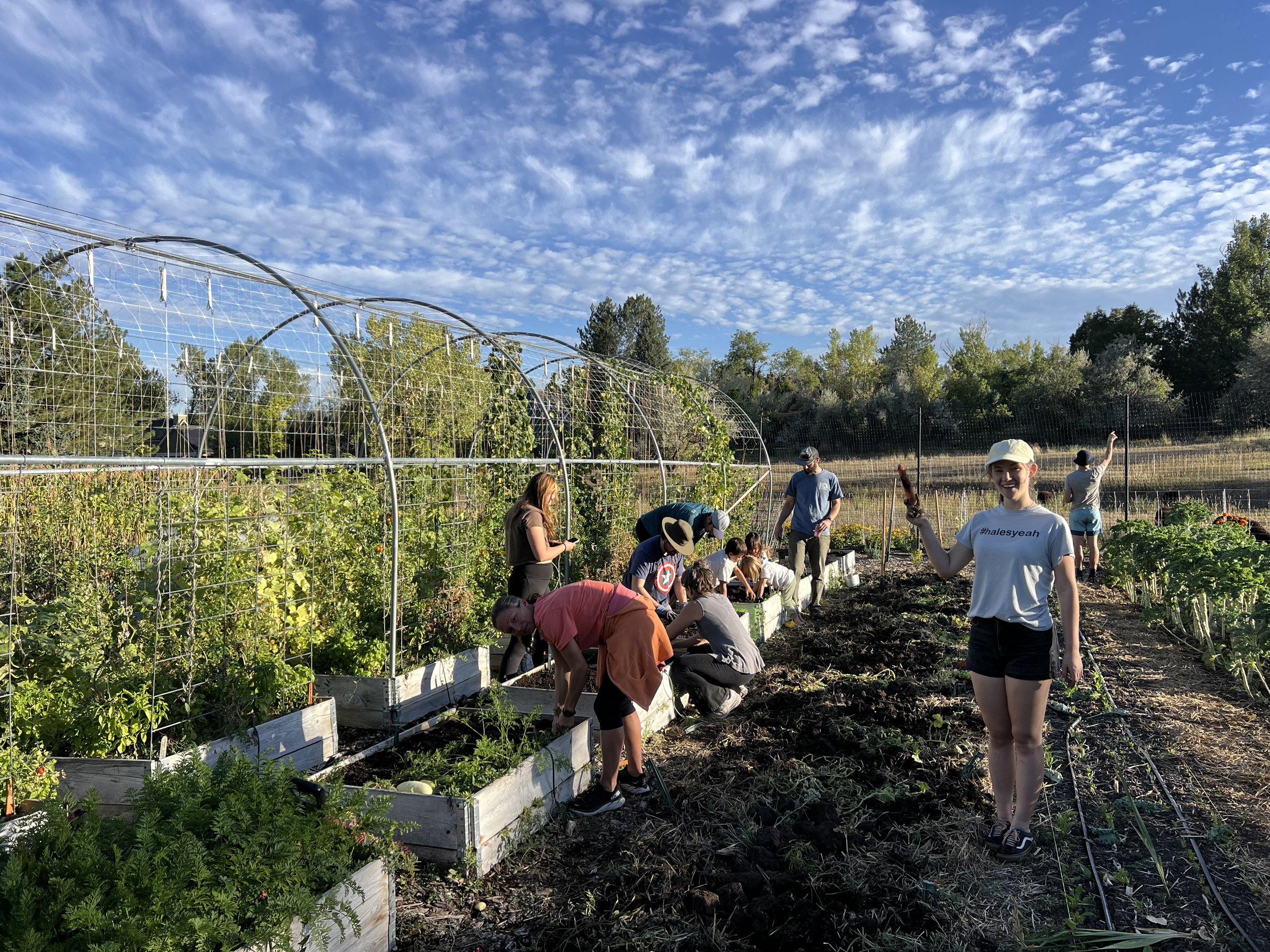CONNECTING WITH THE SEASONS:
a monthly ecology course at Dharma’s Garden that encourages seasonal awareness through walks, discussions, activities, and journaling about the ecological processes happening around us.
Every 3rd Thursday,
June through October 2025
5pm to 7pm
$25 per person per class, includes material fee
Sign up for one, a few, or ALL 5 classes!
This class series at Dharma’s Garden will focus on a different aspect of ecology each month through the lens of land stewardship and connection to seasonality. (See below for EACH month’s detailed description).
$5 OFF for Season Partners/Enthusiasts!
WHAT IS THIS COURSE?
This multi-class series (take one, some or all of the classes!) at Dharma’s Garden will focus on a different aspect of ecology each month through the lens of land stewardship and connection to seasonality. (See below for EACH month’s detailed description). Each class seeks to empower community members with knowledge about the processes of earth, focusing on interconnected relationships between animals / plants / soil / humans, and how individual pieces work together in resilience. Consider this a class on the basics of ecology with nature as our classroom, exploring the land to teach us the cycle of birth, growth, and death through the seasons. Each class will consist of a brief lesson, a group walk around the land with discussion, and an activity to get our hands and bodies moving with the earth.
SKILLS LEARNED:
Students will leave class with more knowledge and vocabulary to understand and discuss the seasonal changes and ecological processes happening around them.
Students will leave with more knowledge of how they can care for and cultivate earth as active participants of change in the environment!
Students will learn the connection between their food and the seasons and ecology of the environment in which it is grown.
Students will be able to zoom into the details of our environment around us with care and attention.
WHO IS THIS SERIES FOR?
This class is for anyone ages 12+ who wants to better understand the natural world around them! We will discuss ecological concepts through easy-to-understand examples. Avid gardeners, nature lovers, home cooks, and science beginners will all learn something new.
JUNE – GARDENING FOR SOIL HEALTH: soil microbiology & succession of ecosystems
Description: In May, we will discuss SOIL! We will talk about the soil food web of tiny microbe communities under our feet and how they tirelessly work to recycle soil into nutrients for plants. We will discuss succession of ecosystems from bare ground to thriving old growth forests and how we fit agriculture into this wide spectrum. We will discuss bacterial and fungal soils, discussing the best kinds of soil for growing, and perennial versus annual plants within these soils. Have you ever wondered how plants receive nutrients from soil? Or what people mean when they say perennial plants? Or what even is compost and soil anyway? How can we provide the soil structure with the ingredients it needs without loading on fertilizers and additives?
JULY – POLLINATION: types of pollinators, plant anatomy, plant reproduction
Description: In the high summer of July, we will discuss the details of plant pollination, from concepts of plant-insect specialization to the differences between male and female anatomy of plants. What do the flowers of lettuce look like? How do borage flowers grow to only allow certain bees to pollinate them? Our group walk will examine what high summer looks like in the gardens and grasslands of Boulder, examining insect-plant specializations and flowers we find on the land.
AUGUST – PATTERN IDENTIFICATION OF PLANT FAMILIES
Description: In May, we will discuss tools for identifying plants around us through patterns that we find in nature! Students will learn about characteristics, uses, and patterns of 5-10 different families, and then identify and discuss characteristics during our group walk around the land. We will learn how to use plant identification to safely recognize plants and their uses. We will also discuss some great first-aid plants that can be found all around us.
SEPTEMBER – PERMACULTURE PRINCIPLES & GARDEN CARE: mulching, cover-cropping and pruning plants for ecosystem functions
Description: In September, we will discuss regenerative agriculture, and some basic principles of soil care, looking at biodynamic and permaculture strategies that foster healthy and diverse gardens. We will discuss garden-care strategies, and sourcing materials sustainably and cost-effectively. How do we care for our gardens in ways that mimic the natural processes of forests? How do we close up our gardens for winter? What is cover-cropping? We will discuss all of this while walking through the different cultivated systems we have at Dharma’s Garden.
OCTOBER – SEED SETTING & SAVING: how seeds develop & how to manage weeds in your garden
Description: In September we will discuss the cycle of seed creation in all types of plants, from wind-pollinated wheats and cereals to marigolds and calendula. We will discuss seed-saving farms and different types of seeds: from walnuts to raspberries to wheat. Have you ever wondered how wheat grows and becomes the powdery flour we turn into cake? What does a carrot seed look like? How can I save my own seeds?
Instructor, Phoebe Draper
I am teaching this class in order to connect others with the powerful feeling of participation that I have found through farming and active stewardship. I hope to create the foundation for participants to connect with and recognize the seasonal patterns of the environment we are within.
I recently moved to Boulder after spending my life in the Blue Ridge foothills of Virginia. I studied architecture and landscape architecture at the University of Virginia and am currently building skills in ecological restoration work, earth tending, and regenerative farming through traveling and working with different landscapes.
I am an artist of varying mediums, primarily in botanical / architectural drawing as well as hoop dance and performance. I find connectivity and ease through identifying and drawing plants, and I look forward to sharing these skills with the Dharma's Garden community.









